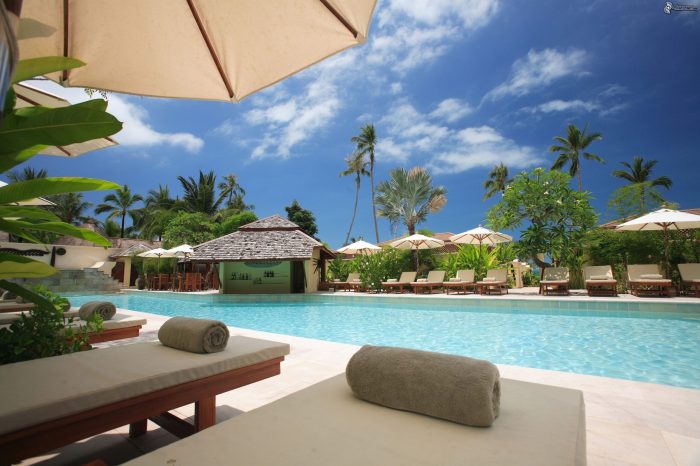How To Choose Between Resort Hotels And City Hotels
When it comes to planning a getaway, the choice between resort hotels and city hotels can be quite the dilemma. Each type of accommodation offers a unique experience that caters to different preferences and travel goals. Whether you’re dreaming of sun-soaked relaxation by the beach or an urban adventure filled with culture and nightlife, understanding the key distinctions between these two options can help you make the right choice for your next trip.
Resort hotels promise a retreat equipped with lavish amenities, recreational activities, and entertainment options all in one location, perfect for those looking to unwind. In contrast, city hotels position you right in the heart of bustling urban environments, giving you immediate access to attractions, dining, and local experiences. This overview will guide you through the essential factors to consider, ultimately helping you decide where to stay.
Understanding Resort Hotels
Resort hotels are uniquely designed to provide guests with a comprehensive vacation experience, often blending luxurious accommodations with a plethora of amenities and activities. Unlike traditional hotels, resorts focus on leisure and recreation, making them ideal for those seeking a getaway without the need to venture far from their temporary home.The key features of resort hotels include spacious rooms and suites that often come with private balconies or patios, offering stunning views of the surrounding landscape.
Many resorts boast full-service spas, multiple dining options ranging from casual to gourmet, and expansive pools with swim-up bars. Furthermore, resorts typically offer additional amenities such as fitness centers, golf courses, and organized group activities.
Activities and Entertainment in Resort Settings
Resort hotels provide an extensive array of activities and entertainment designed to cater to various interests and age groups. This diversity enhances the overall experience and encourages guests to engage more with their surroundings.Some common activities found at resort hotels include:
- Water Sports: Many resorts located near oceans or lakes offer activities like snorkeling, kayaking, and paddleboarding, which allow guests to explore the aquatic surroundings.
- Land Activities: Guests can often participate in activities such as hiking, cycling, or playing tennis on-site. Many resorts also organize guided excursions to nearby attractions.
- Entertainment Programs: From live music performances to themed parties and movie nights, resorts frequently host entertainment events that bring guests together.
- Kids’ Clubs: Family-oriented resorts often have dedicated kids’ clubs, providing supervised activities that allow parents some time to relax while their children enjoy age-appropriate fun.
The advantages of choosing to stay at a resort hotel compared to other forms of accommodation are plentiful. For instance, the all-inclusive packages offered by many resorts simplify budgeting, as accommodation, meals, and activities are combined into one price. Additionally, the convenience of having a variety of activities and amenities on-site means guests can spend less time planning and more time enjoying their vacation.
Another benefit is the opportunity for social interaction. Resorts often create a vibrant community atmosphere where guests can meet new people, participate in group activities, and build lasting memories.
“Staying at a resort hotel transforms a vacation into an all-encompassing experience, where relaxation and adventure coexist harmoniously.”
Exploring City Hotels
City hotels are unique accommodations located in urban areas, often situated in bustling neighborhoods or close to popular attractions. They typically feature modern amenities and are designed for convenience, offering everything from comfortable rooms to essential services tailored for both business and leisure travelers. Staying in a city hotel can provide a vibrant experience, allowing guests to immerse themselves in the local culture, cuisine, and activities right outside their door.The benefits of staying in a city hotel are numerous, primarily revolving around accessibility and convenience.
Urban hotels often boast prime locations, making it easy to explore urban attractions such as museums, restaurants, shopping districts, and nightlife. Visitors can enjoy a rich tapestry of experiences, from dining at renowned local eateries to attending cultural events, all within walking distance or a short public transit ride. Moreover, city hotels often provide business services and meeting facilities, making them an ideal choice for corporate travelers as well.
Characteristics and Amenities of City Hotels
City hotels generally offer a range of facilities designed to cater to diverse guest needs. Here are some key characteristics commonly found in city hotels:
- Central Location: Positioned near major attractions, transportation hubs, and business districts.
- Modern Amenities: Features such as high-speed internet, fitness centers, and in-house restaurants.
- Business Services: Conference rooms, printing services, and concierge assistance for corporate guests.
- Cultural Access: Proximity to museums, theaters, galleries, and local events.
- Dining Options: On-site restaurants that often reflect local cuisine, along with nearby dining choices.
City hotels attract a variety of guests, each with distinct preferences and needs. Business travelers frequently opt for these hotels due to their location and services tailored to work-related needs. Leisure travelers, including tourists, appreciate the convenience of being near attractions and local experiences. Additionally, families may choose city hotels for easy access to entertainment options and kid-friendly activities in the vicinity.
In essence, city hotels serve as gateways to urban life, connecting guests with the vibrancy of the city.
Comparing Location Benefits
The location of your chosen hotel can significantly influence your travel experience, especially when deciding between resort hotels and city hotels. Each type of accommodation provides unique advantages based on its setting, which can cater to different vacation goals, whether that’s relaxation or exploring urban culture.Resort hotels are typically located in scenic areas, often near beaches, mountains, or significant natural attractions.
This positioning allows guests to immerse themselves in nature and enjoy a tranquil atmosphere. On the other hand, city hotels are nestled in urban environments, placing guests at the heart of cultural landmarks, dining, shopping, and vibrant nightlife. The choice between these two styles often hinges on the type of experience one seeks—serenity or stimulation.
Location Influences on Guest Experience
The location of a hotel has a profound effect on the overall experience of guests, impacting activities, accessibility, and the ambiance of their stay. For instance, guests staying at resort hotels often have direct access to outdoor activities like hiking, snorkeling, or skiing, depending on the locale. This proximity to nature creates opportunities for relaxation and adventure right outside the door, fostering a sense of escape from everyday life.
Conversely, city hotels offer the thrill of being close to urban attractions. Guests can easily explore museums, theaters, and local eateries, making it convenient to dive into the local culture. The hustle and bustle of the city can energize visitors, providing a dynamic backdrop for their stay.To illustrate the differences, here’s a comparison table highlighting popular destinations for both resort and city hotels:
| Type of Hotel | Popular Destinations | Key Attractions |
|---|---|---|
| Resort Hotel | Maui, Hawaii | Beaches, Waterfalls, Snorkeling |
| Resort Hotel | Maldives | Private Villas, Coral Reefs, Spa Services |
| City Hotel | New York City, USA | Times Square, Central Park, Broadway |
| City Hotel | Tokyo, Japan | Shibuya Crossing, Temples, Shopping Districts |
“Choosing the right location can transform a good trip into an unforgettable adventure.”
Cost Considerations

Source: mangotreetravel.com
When choosing between resort hotels and city hotels, cost plays a vital role in decision-making. Understanding the pricing structures of each, along with the additional costs that may arise, can help travelers make informed choices that align with their budgets and expectations. This section delves into the financial aspects associated with both types of accommodations, evaluating the value they offer based on amenities and services.The pricing structures of resort hotels typically include a base rate that covers accommodations, meals, and recreational activities, reflecting a comprehensive experience.
In contrast, city hotels often have a lower base rate, focusing more on convenience and location, but additional expenses for dining and activities can accumulate quickly. Therefore, it’s crucial to analyze what each option includes and whether the amenities justify the cost.
Additional Costs to Consider
Understanding the full financial implications of your stay requires an awareness of extra costs. These can vary significantly between resort hotels and city hotels. Here’s a breakdown of possible additional expenses to keep in mind:
Resort Hotels:
- Resort Fees: Many resorts charge daily fees for facilities like pools, gyms, and entertainment.
- Dining Costs: While meals may be included or discounted, premium dining options often come at an additional price.
- Activity Fees: Excursions, spa treatments, and other activities may require separate payments.
City Hotels:
- City Taxes: These can add a significant amount to your total bill, varying by location.
- Parking Fees: If you’re driving, parking in urban areas can be expensive, often charged per day.
- Internet Charges: Some city hotels charge for Wi-Fi access, which might be complimentary in resorts.
“It is essential to consider not just the nightly rate, but also the total cost of your stay, including additional fees that may apply.”
Ultimately, the choice between resort hotels and city hotels should reflect both your budget and your vacation goals. By carefully weighing these cost considerations, you can select the perfect accommodation that offers both value and enjoyment.
Target Audience and Demographics

Source: combadi.com
Understanding the audience and demographics that gravitate towards resort hotels versus city hotels is essential for making informed travel choices. Both types of accommodations cater to different groups of travelers, each with unique priorities and preferences. By recognizing who prefers what, you can better align your stay with your personal travel style and needs.
Demographics Favoring Resort Hotels
Resort hotels tend to attract specific demographics, with families and couples being the primary segments. Families are often drawn to resorts because of the wide array of activities for children, such as pools, kids’ clubs, and family-friendly entertainment. Couples, particularly those on honeymoon or romantic getaways, favor the serene environments and luxurious amenities that resorts offer, like spa services and private beaches.In contrast, solo travelers may choose resorts for relaxation and self-care, often valuing features like wellness programs and tranquil settings.
The allure of a resort can be further highlighted by the all-inclusive options, which allow guests to enjoy their stay without the hassle of planning every meal or activity.
Demographics Favoring City Hotels
City hotels typically attract business travelers, culture enthusiasts, and tourists seeking urban experiences. Business travelers appreciate the proximity to convention centers and corporate offices, along with the availability of meeting facilities. Culture enthusiasts are drawn to city hotels for their closeness to museums, theaters, and historic sites, allowing for easy exploration of local attractions.Solo travelers in cities often prioritize accessibility to local public transport, nightlife, and dining options.
Many enjoy the vibrant atmosphere city hotels provide, as they are often situated in the heart of urban life, offering a plethora of activities just outside their door.
Guest Preferences and Priorities
When choosing between resort and city hotels, guests prioritize various factors based on their travel purpose and demographic characteristics. Understanding these preferences can help clarify the distinctions between these two types of accommodations.Factors that guests typically consider include:
- Location: Resort hotels are generally located near beaches or scenic landscapes, while city hotels are close to business districts and cultural landmarks.
- Amenities: Resorts often provide extensive recreational facilities, such as pools, spas, and onsite dining options, whereas city hotels may focus more on convenience and access to local attractions.
- Cost: Families may opt for resorts that offer all-inclusive packages to manage expenses, while solo or business travelers might seek city hotels that provide competitive rates for short stays.
- Atmosphere: Resorts are favored for relaxation and leisure, while city hotels appeal to those seeking vibrant, fast-paced environments.
- Activities: Families look for resorts with children’s programs, while couples may seek romantic experiences, and solo travelers might favor city hotels with nightlife and cultural offerings.
“Understanding your audience’s demographics and preferences is key to selecting the right type of accommodation for an enjoyable travel experience.”
Seasonal Differences
Seasons play a significant role in shaping the appeal and occupancy rates of both resort hotels and city hotels. Understanding these seasonal differences can help travelers make informed decisions about where to stay during their trips. From pricing trends to activities that capture the spirit of each season, the choice between a resort and a city hotel varies greatly with the calendar.The appeal of resort hotels often peaks during the summer and winter holidays, where guests seek sun-soaked beaches or winter wonderlands.
Conversely, city hotels may see their highest occupancy during spring and fall, attracting business travelers and tourists looking to explore urban attractions. Seasonal pricing trends also reflect these shifts, often leading to promotional offers that entice visitors to book accommodations during off-peak times.
Seasonal Pricing Trends and Promotional Offers
Resort hotels typically employ dynamic pricing strategies based on the seasons, often charging higher rates during peak tourist periods. Conversely, during the off-peak seasons, many resorts offer attractive promotional deals to maintain occupancy. Seasonal pricing can vary significantly between resort and city hotels, as each caters to different types of guests. Promotional offers at resort hotels can include:
- Package deals that combine accommodation with meals and activities.
- Discounted rates for extended stays, often seen during the fall and spring.
- Seasonal early-bird discounts that encourage booking in advance for summer and winter holidays.
City hotels, on the other hand, may offer:
- Last-minute deals aimed at business travelers or spontaneous tourists during less busy weekdays.
- Special rates for events and conferences, particularly in urban areas with many attractions.
- Seasonal promotions tied to local festivals, effectively drawing guests during these vibrant times.
Popular Seasonal Activities
Resorts and cities provide unique seasonal activities that cater to different types of travelers. Understanding these activities can enhance the holiday experience for visitors, ensuring they maximize their stay.Popular seasonal activities in resorts often include:
- Summer: Water sports, beach volleyball, and sunset cruises.
- Winter: Skiing, snowboarding, and cozy bonfires.
- Spring: Nature hikes, outdoor yoga classes, and garden tours.
- Fall: Harvest festivals, wine tasting tours, and scenic foliage walks.
In contrast, city attractions shine during different seasons, with activities such as:
- Summer: Outdoor concerts, city tours, and street fairs.
- Winter: Holiday markets, ice skating in public squares, and festive light displays.
- Spring: Art festivals, street parades, and blooming botanical gardens.
- Fall: Cultural events, food festivals, and theater performances.
Visitors can consider these seasonal differences when choosing between resort hotels and city hotels, ensuring that their travel experience aligns with their expectations and interests.
Personalization and Service
In the realm of hospitality, personalized service plays a crucial role in shaping a guest’s overall experience. Both resort hotels and city hotels offer various levels of personalization, yet the approach to service often differs significantly. This discussion delves into how each type caters to the individual preferences and needs of their guests, highlighting unique services that enhance the stay.
Personalized Service in Resort Hotels
Resort hotels are renowned for their commitment to providing exceptional personalized service. They often feature dedicated staff who are trained to anticipate guest needs and provide tailored experiences. This could range from private check-ins to personalized welcome amenities in the room, such as a favorite bottle of wine or a selection of local delicacies.In many resort settings, the following services exemplify their focus on personalization:
- Concierge Services: Resort concierges often go above and beyond, arranging personalized excursions or spa treatments based on guest preferences.
- Customized Dining: Many resorts offer bespoke dining experiences, where chefs prepare meals tailored to dietary restrictions and personal tastes.
- Activity Planning: From private yoga sessions on the beach to guided tours of local attractions, resorts create personalized itineraries that cater to individual interests.
Personalized Service in City Hotels
City hotels, while perhaps less focused on the extensive personalization found in resorts, still provide a variety of tailored services aimed at enhancing the urban guest experience. These hotels often cater to business travelers and tourists alike, ensuring that their needs are met through efficient and personalized service options.Some distinctive services offered by city hotels include:
- Business Support: Many city hotels provide dedicated business centers and personalized assistance with meeting setups, catering to corporate guests.
- Local Experiences: City hotels frequently partner with local businesses to offer unique, personalized tours or experiences that showcase the city’s culture and attractions.
- Room Customization: Guests can often request specific amenities such as extra pillows, aromatherapy options, or in-room entertainment tailored to their preferences.
“Personalization in hospitality creates memorable experiences that guests associate with a sense of belonging and care.”
By understanding the nuances of personalization and service in both resort and city hotels, travelers can make more informed decisions based on their preferences and the type of experience they seek.
Booking Strategies
When it comes to booking accommodations, whether you’re leaning towards a resort hotel or a city hotel, strategic planning can make a significant difference in your experience. Understanding the nuances of each type can help you uncover the best options for your travel needs. Employing effective booking strategies not only saves you money but ensures that you get the most out of your stay, aligning your choice with your personal preferences and travel goals.
Best Practices for Booking
Choosing the right time and method for booking can greatly affect your travel experience. Here are some best practices to keep in mind when booking resort versus city hotels:
- Timing is Key: Both resort and city hotels often have peak seasons. Researching the best times to book can help you avoid high prices and increase your chances of getting a good deal. For resorts, consider off-peak seasons, while city hotels may have lower rates during weekdays.
- Flexible Dates: If your schedule allows, being flexible with your travel dates can open up more options and better rates. Use fare comparison tools to identify the cheapest days to book.
- Membership Programs: Many hotels offer loyalty programs that provide discounts, upgrades, and exclusive deals. Joining these programs can be beneficial, especially for frequent travelers.
- Direct Booking: Booking directly through the hotel’s website often comes with perks such as free breakfast, room upgrades, and better cancellation policies. Always check for any ongoing promotions.
Finding Deals and Packages
To find the best deals or packages tailored to resort or city accommodations, it’s important to utilize various strategies:
- Comparison Websites: Use travel comparison sites like Expedia, Kayak, or Trivago to compare prices across different hotels and websites. These platforms can frequently uncover hidden deals.
- Subscribe to Alerts: Sign up for price alerts from various travel websites. This will notify you when prices drop for your desired accommodations.
- Package Deals: Look for vacation packages that combine flights and hotels, as these can sometimes offer considerable savings.
- Utilize Social Media: Follow hotels on social media platforms where they may announce flash sales or exclusive promotions available only to followers.
Traveler Checklist
When weighing your options between resort and city hotels, an organized checklist can aid in your decision-making process. Consider the following factors:
- Purpose of Travel: Assess whether your trip is for leisure, business, or adventure. This influences the type of accommodation that suits you best.
- Desired Amenities: List out what amenities are essential for your stay, such as pools, spas, or proximity to attractions.
- Budget: Set a clear budget for your accommodation and ensure that you factor in additional costs like resort fees or parking.
- Travel Companions: Identify the needs and preferences of those traveling with you, which may sway your choice between a resort experience or a city hotel.
- Local Exploration: Determine how much you want to explore the local area. City hotels may offer more cultural experiences, while resorts might provide a more secluded environment.
Ending Remarks

Source: viceroybali.com
In conclusion, the choice between resort hotels and city hotels boils down to what you seek from your travel experience. While resorts offer a serene escape with abundant leisure activities, city hotels provide the thrill of exploration just outside your door. By weighing considerations like location, cost, and guest demographics, you can confidently pick the option that aligns with your vacation goals, ensuring a memorable stay wherever you decide to go.
Quick FAQs
What are the main differences in amenities offered?
Resort hotels typically provide extensive recreational facilities like pools, spas, and organized activities, while city hotels focus more on convenience and access to local attractions.
Are resort hotels more expensive than city hotels?
Not necessarily. Resort hotels may include many amenities in their pricing, while city hotels might have lower rates but add costs for services and parking.
Which type of hotel is better for families?
Resort hotels often cater to families with kid-friendly activities and facilities, while city hotels can provide easy access to educational and cultural attractions.
How do the check-in processes differ?
Resort hotels may offer more personalized check-in experiences, sometimes including welcome drinks or tours, while city hotels generally have a faster, streamlined check-in process.
What should I consider when booking a hotel?
Consider location, amenities, pricing, seasonal trends, and guest reviews to find the best fit for your preferences and budget.









